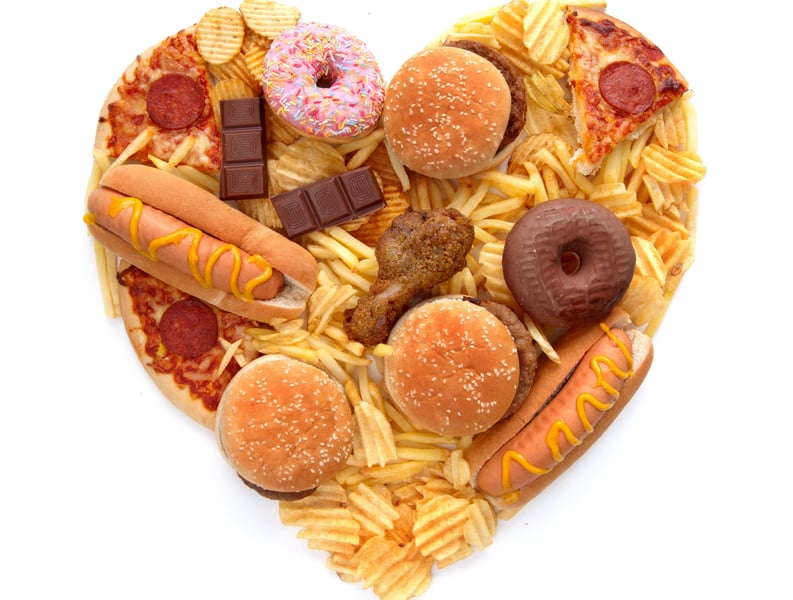Get Healthy!

- Posted September 1, 2022
Lots of Ultra-Processed Foods Could Raise a Man's Odds for Colon Cancer
Many guys love a breakfast plate piled high with sausages and maybe a sugar-glazed danish on the side. Now, research shows that wolfing down too many ultra-processed foods like these could be bad news for a man's colon.
Specifically, men who consumed the highest amount of ultra-processed food had a 29% greater risk for developing colon cancer, when compared to men who consumed smaller amounts. Surprisingly, there was not an increased risk for women who consumed higher amounts of ultra-processed foods.
"The study provides evidence of the potential link between ultra-processed foods and colorectal cancer, and supports the public health importance of limiting certain types of ultra-processed foods for promoting better health outcomes in the population,"said study author Lu Wang. She is a postdoctoral fellow at the Friedman School of Nutrition Science and Policy at Tufts University in Boston.
Ultra-processed foods are high in added sugar, oils/fats and refined starch, all of which contribute to weight gain and obesity, and obesity is a well-known risk factor for colorectal cancer, Wang explained.
"They are also low in beneficial nutrients and bioactive compounds, such as minerals and vitamins," Wang added.
Exactly why only men appear to be at higher risk isn't known. "One possible explanation is the composition of the ultra-processed foods consumed by women could be different than that from men,"she said, noting that ultra-processed dairy foods like yogurt may counteract the harmful impacts of other types of ultra-processed foods in women. "Further research will need to determine whether there is a true sex difference," Wang added.
The study included more than 200,000 U.S. men and women (nearly 160,000 women and about 46,000 men) from three large studies of health care professionals. Participants completed food frequency questionnaires every four years that asked how often they ate about 130 foods. Intake of ultra-processed foods was classified into quintiles, ranging from the lowest amount to the highest.
During more than 25 years of follow-up, there were 1,294 cases of colon cancer in the men and 1,922 cases among the women, the investigators found.
Men who ate the most ultra-processed foods were at the greatest risk for developing colon cancer. This was driven largely by ultra-processed meat, poultry or fish-based, ready-to-eat products and sugar-sweetened beverages. The increased risk was particularly clear for tumors in the distal (last part) of the colon.
While the study didn't find an overall increased risk for women who ate higher amounts of ultra-processed foods, those who consumed more ready-to-eat/heat-mixed dishes were at an increased risk of colon cancer.
The findings held even after the researchers controlled for other factors known to increase risk for colon cancer including race, family history of cancer, physical activity, smoking status and alcohol intake.
The study was published online Aug. 31 in the BMJ.
The new findings add to a growing body of research linking diets high in ultra-processed foods to cancer, specifically colon cancer, said Dr. Robin Mendelsohn, co-director of the Center for Young Onset Colorectal and Gastrointestinal Cancers at Memorial Sloan Kettering Cancer Center, in New York City.
Certain chemicals used in processed meats such as nitrates and nitrites, which keep meat fresh, or heterocyclic amines, which are produced when meat is cooked at a high temperature, are known to cause cancer, Mendelsohn noted.
Her best advice?
"Eat a plant-based diet,"Mendelsohn said. "About two-thirds of your plate should be fruits, vegetables and whole grains, with the rest being lean meats, fish, poultry and legumes. Limit red meat and try to avoid processed meats."
Ultra-processed foods contain chemicals that may alter the healthy bacteria in the gut, which can worsen inflammation and lead to an increased risk of colon cancer, explained Dr. Amitpal Johal, division chief of gastroenterology at Geisinger in Danville, Pa.
"More studies need to be done to better understand what characteristics of ultra-processed foods lead to the higher rates of colon cancer,"said Johal.
Reducing the amount of ultra-processed foods in your diet and including things like fruits, vegetables, calcium, vitamin D and foods that are high in fiber can help lower risk for colon cancer, he explained.
"Exercise, proper sleep hygiene, and controlling an individual's weight can also help,"Johal added.
Men and women should also schedule regular screening colonoscopies once they've reach 45, he advised.
More information
The American Cancer Society has more on how to prevent colon cancer.
SOURCES: Lu Wang, postdoctoral fellow, Friedman School of Nutrition Science and Policy, Tufts University, Boston; Robin Mendelsohn, MD, gastroenterologist, co-director, Center for Young Onset Colorectal and Gastrointestinal Cancers, Memorial Sloan Kettering Cancer Center, New York City; Amitpal Johal, MD, division chief, gastroenterology, Geisinger, Danville, Pa.; BMJ, Aug. 31, 2022, online
